Our History
NCLCV, founded as the Conservation Council of North Carolina, has been doing environmental work for more than 50 years.
1968
Founding
Conservation Council of NC (now NCLCV) was formed by largely academic types to protect NC’s natural resources. They used citizen education, lawsuits, and advocacy as their primary tactics. They recognized early on that we needed to make the environment a part of governmental decisions.
CCNC was involved with:
- Establishment of the Joyce Kilmer Wilderness Area
- Opposition to dam proposals in the Upper French Broad River Basin
- Legal interventions against Shearon Harris and Brunswick nuclear power plants
- Support for the establishment of state parks and wilderness areas
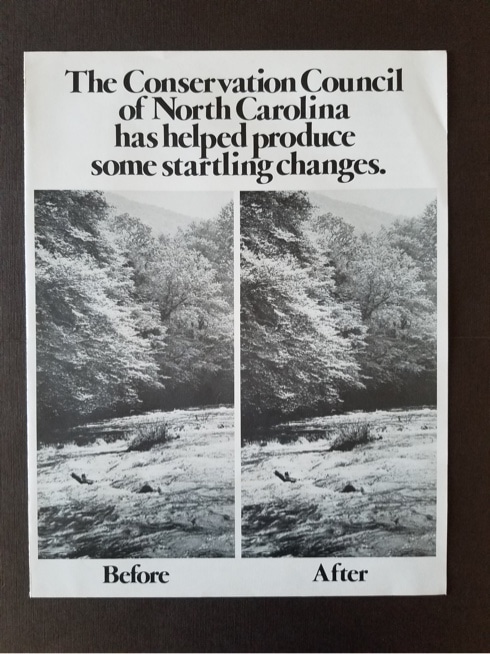
1970’s
1971
First Land Trust
Conservation Foundation of NC, NCLCV’s sister organization, is established as a 501(c)3, and acts as the first land trust in the state, protecting 10-15 small tracts of special lands.
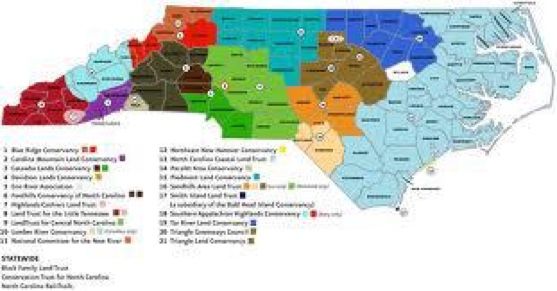
Bald Head Island Project
Governor Bob Scott decides to conserve, instead of develop Bald Head Island.
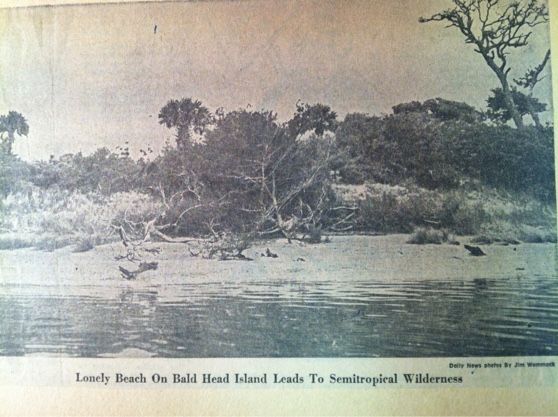
1972
1974
Jordan Dam
NC Conservation Council fought against Army Corps of Engineers to remind them of their duty of environmental protection.
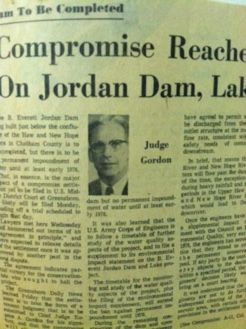
Support to Conserve Neuse River
In support of a bill that would include New River in the U.S. Wild and Scenic River System, John Curry and Wade Barber of North Carolina Conservation Council canoed along the New into the Gauley River in West Virginia.
Lobbied to protect New Hope Reservoir, Joyce Kilmer Wilderness, and New River
Went to court to see that environmental regulations were observed at Bald Head Island, New Hope Reservoir, Jordan Lake
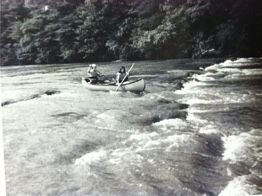
CCNC Releases Resolution
Conservation Council of North Carolina releases a resolution in support of: Beaucatcher Mtn. Defense Fund, Clean Energy Petition, State Park on Eno River, and Mass Transportation Systems.
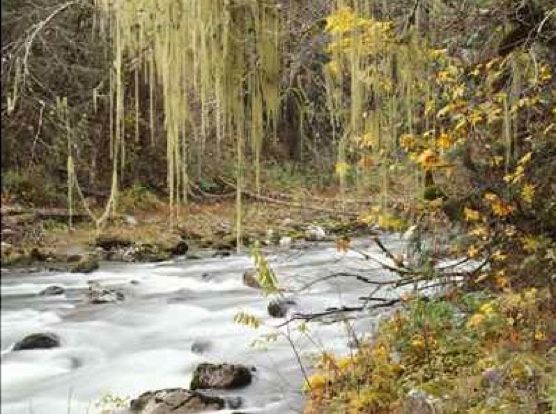
1975
1979
First Environmental Lobbyist, Bill Holman
Bill Holman becomes the first environmental lobbyist for Conservation Council of North Carolina (CCNC) and is rated as one of the top six lobbyists in North Carolina. He worked for CCNC, Sierra Club, and NC Wildlife Federation.
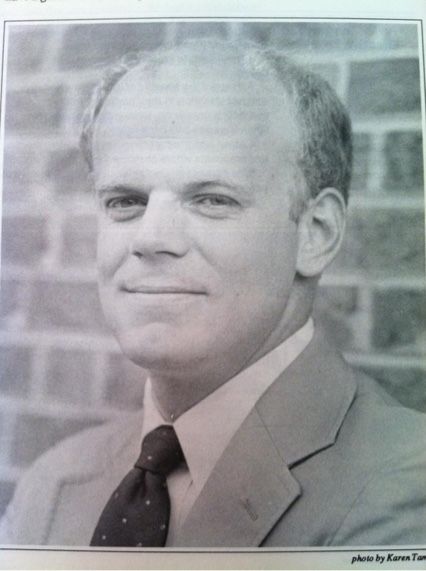
CCNC and Sierra Club Fight to Reduce Emissions
CCNC teaches Environmental Management Commission to meet tighter emission limits.
1982
1983
CCNC Fights Southeastern Radioactive Waste Compact
Conservation Council Lobbies the General Assembly against North Carolina’s ratification of the Southeastern Radioactive Waste Compact.
Dan Besse serves as Chairman of Coastal Resources Commission
CCNC’s Past President, Dan Besse, is appointed by Gov. Martin to serve a second term as Chairman of the Coastal Resources Commission, which sets guidelines for coastal development.
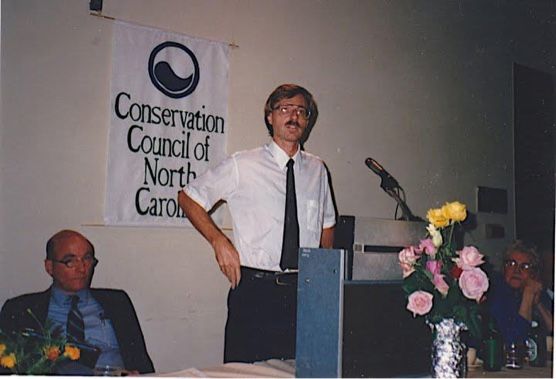
1986
1988
CCNC's 20th Anniversary
Gov. Jim Martin and Lt. Gov. Bob Jordan presented their views and promises on environmental issues.
CCNC Conference on Energy and Environment
Hunter Lovins, internationally renowned alternative energy expert, participated in the conference, “How energy choices affect us and how we can affect energy choices.”
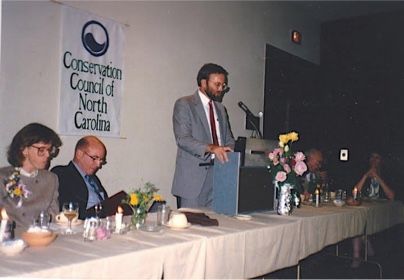
CCNC supports the Coastal Resources Commission ban of “hardening” the coast with seawalls and bulkheads
Helped pass the Pollution Prevention Pays bill which was a solid waste management act goal to reduce waste by 40%.
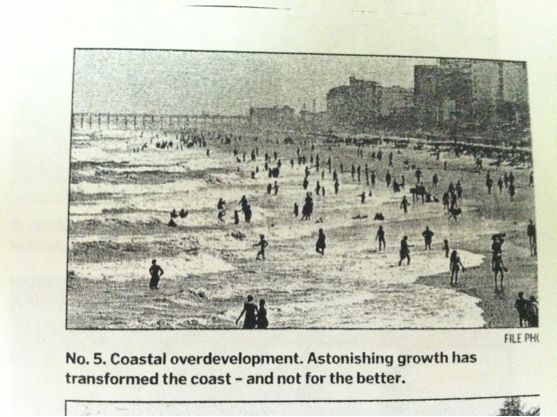
1989
1990
Raleigh-Durham, Greensboro, Winston Salem Make Dirtiest Air List; CCNC Presents Air-Quality Position Paper
Within CCNC’s position paper, issues such as toxic air emissions, urban air pollution, acid rain, and pollution prevention are emphasized.
CCNC Presents An Environmental Blueprint
Priorities stated in the Conservation Council of North Carolina’s Environmental Blueprint included those affecting air quality, such as: toxic air emissions, urban air pollution, and acid rain.
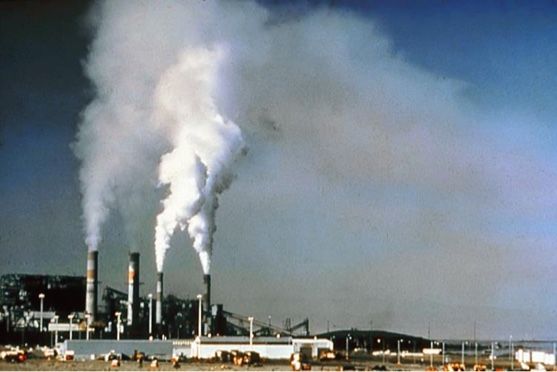
1991
1999
CCNC released its first Legislative Scorecard
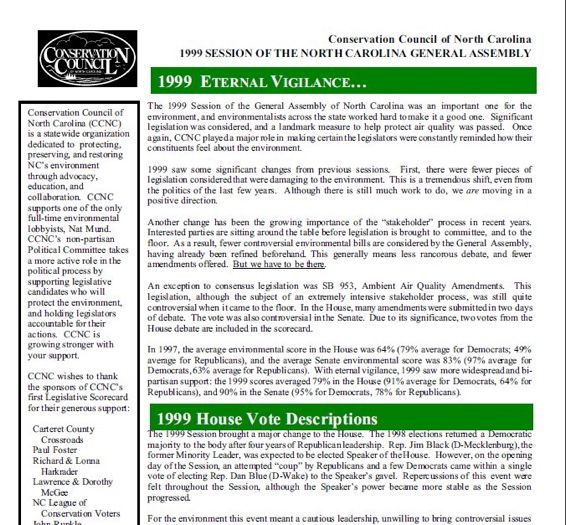
Carrie Clark Joins NCLCV
Carrie joined NCLCV as the Executive Director, after working in the environmental community since 1996.
Conservation PAC Established
NCLCV established the Conservation PAC in order to work directly to elect candidates to office who share our values–who care about clean air, safe water, and our unique landscapes…Candidates who understand that a sound environment, a strong economy, and healthy communities go hand in hand.

CCNC and environmental advocates helped pass the NC Clean Smokestacks Act
Brought our clean power plants up to current air quality standards. This was the biggest win of a decade.
2002
2007
1st Annual Green Tie Awards
The1st Annual Green Tie Awards Dinner was held in 2007, honoring individuals who have made particularly great contributions to the protecting North Carolina’s environment. Former Speaker of the N.C. House Joe Hackney received the inaugural Jane Sharp Lifetime Environmental Champion Award in honor of his longtime advocacy of environmental issues in N.C. General Assembly. Speaker Hackney was, himself, a member of NCLCV during the early years of the group when it held meetings in Mrs. Sharp’s basement.
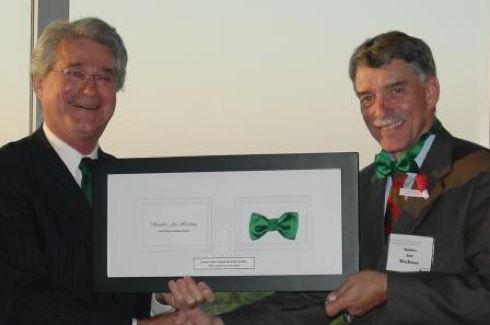
CCNC and environmental advocates passed the Renewable Energy Portfolio Standards
Which required that 12.5% of North Carolina’s energy must be provided through renewable energy resources or energy efficiency measures by 2021.




